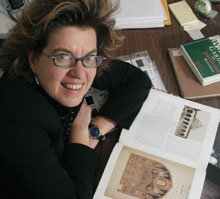Show on Indian art travels the U.S.

Maria Antonella Pelizzari
Photo by Andrew Dobrowolskyj
If you have any connection with the Art History Department, you may have run into her in the slide library. Maria Antonella Pelizzari is a passionate spirit with a melodic Italian accent who teaches at Concordia.
Pelizzari is an engaging communicator, with an openness that one might attach to a student starting out. You would never know, in fact, that she was – and is – the curator of the Canadian Centre for Architecture’s show and book Traces of India, which went on to the Yale Center for British Art in Connecticut, and to the Fowler Museum in Los Angeles, where it opens on March 7.
“This was a very particular show for the CCA,” Pelizzari said in an interview. “They had never done a show on any part of the developing world before.”
It was also the first CCA show to weave newspaper cuttings, postcards and movie clips amongst the exhibit’s more than 200 photographs. “These gave a social context to the show, exploring notions of how we look at architecture and not just what we see.”
Perhaps for that reason, the show was described by the New York Times as a “visual essay, a think piece.”
This fresh approach drew new audiences to the museum: not only historians of photography but also members of the Indian community, travellers, and many people who simply had their own personal connection with India.
“I think people understand photographs more than architectural drawings. That made it a very accessible show.”
Accessibility is one of Pelizzari’s recurrent themes. Still, with one foot deep in the academic world, she values the need for the concrete. “There is a great need here at Concordia for reality,” she said. “I think, actually, all students have that need.”
One class she taught last term explored the representation of different geographies through photography. “It raised questions about how Canada is visualized. Students used this theme to talk about all aspects of Canada, from tourism to the construction of the CPR.”
Her teaching reaches beyond the department. Students of journalism, history and anthropology last fall had the opportunity to take an elective class she gave on Photography and Visual Culture.
Hired on a one-year limited-term appointment, she began teaching at Concordia in September after huge funding cuts at the CCA meant the end of her position, and many others.
“I am still contracted to follow the show as it tours,” she said. She has already been to reorganize the show to fit the space at Yale, and she will be at the hanging of the Fowler Museum show, too.
“What’s interesting is that the three museums will have brought such different audiences to the show. The CCA is an architectural museum, Yale is a museum of British art, and the Fowler museum is anthropology-based.”
Pelizzari came to North America from Genoa in 1992 to immerse herself in the world of photography scholarship, archives and conservation practices. Later, she enrolled in a PhD program at the University of New Mexico. Now, her specialty is colonialist and post-colonialist contemporary art.
It was in 1999, when she took on the associate curator role at the CCA, that she made her first foray into the world of teaching. Five years later, she much prefers teaching to working in a museum.
“I felt more comfortable in the classroom than in the archives. It uses a completely different side of you. I think my personality is more conducive to working with students.” Still, she might be open to the odd freelance curatorial gig from time to time.